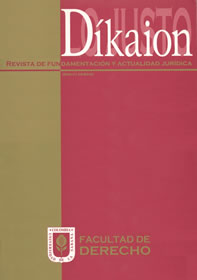Observaciones sobre el tratamiento del derecho de defensa en la implementación del sistema acusatorio
Keywords:
Principle, democratic State, right to defense, Code of Criminal Procedure.Abstract
If in the draft of the code of criminal procedure, passed at its second debate by the House of Representatives’ full meeting, the Attorney/ Prosecutor’s Office (the “Fiscalía”) is empowered to not exhibiting all of the cognitive means in its hands at the time of making the imputation or requesting the imposition of the securing measure (medida de aseguramiento) and, if in the end it can submit them at the time the counsel of the defense requests the repeal or annulment of the above-mentioned measure, it becomes evident that with this act the guiding principles of loyalty, equality and contradiction are being violated, as well as the fundamental right of defense established in the Constitution, the New York Pact and the San José de Costa Rica Convention.
It is not reasonable to replace, based on efficiency criteria, the so-called faceless prosecutors with prosecutors who show their faces but hide the evidences to take the defendant by surprise at the hearing.
Therefore, it is imperative to withdraw from the proposed code the power to reserve demonstrative resources to be used by the attorney/prosecutor’s office at the time of making the imputation or when requesting the imposition of the securing measure, since only in this way the governing principles stated in the same statute can become effective; in this way, the right to defense acknowledged in the constitution and in the constitutionality block will be ensured in order to make the procedural system to be soon instituted become materially legitimate and valid.
Downloads
Downloads
How to Cite
Issue
Section
License
1. Proposed Policy for Journals That Offer Open Access
Authors who publish with this journal agree to the following terms:
This journal and its papers are published with the Creative Commons License Attribution-NonCommercial-NoDerivatives 4.0 International (CC BY-NC-ND 4.0). You are free to share copy and redistribute the material in any medium or format if you: give appropriate credit, provide a link to the license, and indicate if changes were made; don’t use our material for commercial purposes; don’t remix, transform, or build upon the material.






